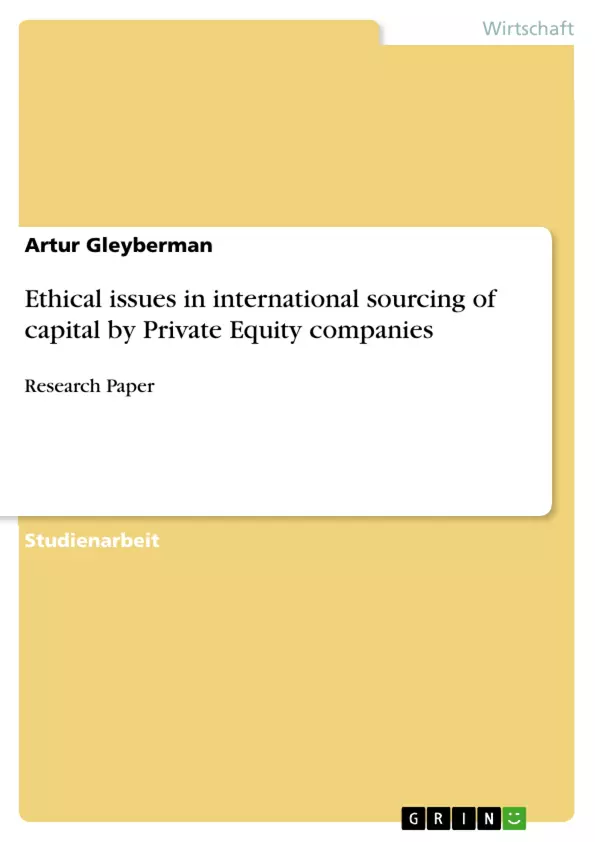Sourcing of capital by international Private Equity (PE) Companies raises many concerns which led to numerous public and academic arguments. Since PE Companies practice little disclosure about their business activities, they have been surrounded by various myths about their profitability and impact on employment. As the result they have been compared to locusts and accused of negative impact on employment. This paper, based on secondary research, aims to explore which ethical issues PE Companies and the American-based Goldman Sachs Private Equity Group (GS PEG) in particular have been facing while sourcing capital from and into Germany and how they deal with the problem of negative public image. The paper provides relevant PE background information, comprehensive literature review and finally forms the conceptual and ethical framework which is applied to analyse GS PEG.
The most interesting findings of the research are that PE Companies do have a slightly negative impact on the employment, but only as catalyst of creative destruction, which means that at large PE Companies create more new jobs and have a positive impact on the economy. Regarding public image, GS PEG pretends to comply with CSR requirements but does not really bind itself to its own Code of Ethics. It was finally found that GS PEG does not experience any significant threat from their struggling public image or legal constraints to be seriously concerned about.
Inhaltsverzeichnis
- Introduction
- Background Information
- PE Industry and GS PEG
- Goldman Sachs Private Equity Group.
- Illustration of the capital sourcing process.
- Literature Review
- Ethical Issues in the Capital Sourcing Process...
- Codes of Conduct and Implementation of CSR
- Philosophical Approaches to Ethics vs. Culture........
- Impact of PE on Employment ....
- Creative Destruction vs. the 'Modern-day Capitalism'.
- Conceptual Framework.
- Findings, Analysis and Discussion........
- GS PEG's Impact on Employment........
- GS PEG's Public Image Problems
- GS PEG's Ethical Practice and Image Improvement
- Significance of PE's Public Image for GS PEG's Profitability .......
- Research Methods
- Evaluation of Information Resources.
- Conclusion
- References...
Zielsetzung und Themenschwerpunkte
Diese Forschungsarbeit zielt darauf ab, ethische Herausforderungen im Zusammenhang mit der Kapitalbeschaffung durch internationale Private-Equity-Unternehmen (PE) zu untersuchen. Der Fokus liegt dabei auf der Goldman Sachs Private Equity Group (GS PEG) und ihren Aktivitäten in Deutschland. Die Arbeit analysiert die ethischen Spannungen, die bei der Kapitalbeschaffung aus und in Deutschland auftreten, und untersucht, wie GS PEG mit dem Problem des negativen öffentlichen Images umgeht.
- Ethische Aspekte der Kapitalbeschaffung durch PE-Unternehmen
- Der Einfluss von PE-Unternehmen auf den Arbeitsmarkt
- Die Rolle von Corporate Social Responsibility (CSR) im Kontext von PE
- Das öffentliche Image von PE-Unternehmen und seine Auswirkungen auf die Profitabilität
- Die Beziehung zwischen ethischen Prinzipien, lokaler sozioökonomischer Kultur und PE-Unternehmen
Zusammenfassung der Kapitel
- Introduction: Die Einleitung stellt das Thema der Forschungsarbeit vor und skizziert den aktuellen Diskurs um die Rolle von PE-Unternehmen im globalen Kontext. Sie hebt das negative öffentliche Image von PE-Unternehmen hervor und verdeutlicht die Bedeutung ethischer Fragen in der Kapitalbeschaffung.
- Background Information: Dieses Kapitel liefert wichtige Hintergrundinformationen über die PE-Industrie und GS PEG. Es erläutert den Kapitalbeschaffungsprozess und zeigt auf, wie ethische Spannungen in diesem Prozess entstehen können.
- Literature Review: Dieser Abschnitt beleuchtet verschiedene ethische Aspekte der Kapitalbeschaffung, die in der wissenschaftlichen Literatur diskutiert werden. Hier werden verschiedene Ansätze zur Ethik, Codes of Conduct und die Implementierung von CSR sowie die Auswirkungen von PE auf den Arbeitsmarkt beleuchtet.
- Conceptual Framework: Auf Basis der in der Literatur gewonnenen Erkenntnisse entwickelt dieses Kapitel ein konzeptionelles Rahmenwerk, das zur Analyse der ethischen Herausforderungen von GS PEG dient.
- Findings, Analysis and Discussion: In diesem Kapitel werden die Ergebnisse der Analyse von GS PEG präsentiert und diskutiert. Es werden die Auswirkungen von GS PEG auf den deutschen Arbeitsmarkt, die Probleme mit dem öffentlichen Image, die ethischen Praktiken des Unternehmens und die Bedeutung des Images für die Profitabilität untersucht.
- Research Methods: Dieses Kapitel erläutert die angewandten Forschungsmethoden und die Bewertung der Informationsquellen.
Schlüsselwörter
Die wichtigsten Schlüsselwörter und Schwerpunktthemen dieser Forschungsarbeit sind Private Equity, Kapitalbeschaffung, ethische Herausforderungen, Corporate Social Responsibility, öffentliches Image, Goldman Sachs Private Equity Group, Arbeitsmarkt, Creative Destruction, Deutschland, internationale Geschäftsbeziehungen.
Häufig gestellte Fragen
Welche ethischen Probleme gibt es bei Private Equity (PE) Unternehmen?
Kritikpunkte sind mangelnde Transparenz, Vorwürfe der Arbeitsplatzvernichtung („Heuschrecken-Debatte“) und die Diskrepanz zwischen ethischen Kodizes und tatsächlichem Handeln.
Welchen Einfluss hat Private Equity auf den Arbeitsmarkt?
Die Forschung zeigt einen leicht negativen Effekt auf die Beschäftigung im Sinne der „schöpferischen Zerstörung“, wobei langfristig oft neue, effizientere Arbeitsplätze entstehen.
Wie geht die Goldman Sachs PE Group (GS PEG) mit CSR um?
Die Arbeit stellt fest, dass GS PEG zwar vorgibt, CSR-Anforderungen zu erfüllen, sich aber nicht strikt an den eigenen Ethik-Kodex gebunden fühlt.
Schadet ein negatives öffentliches Image der Profitabilität von PE-Firmen?
Die Untersuchung von GS PEG ergab, dass das schlechte öffentliche Image oder rechtliche Einschränkungen bisher keine signifikante Bedrohung für die Profitabilität darstellen.
Was bedeutet der Begriff „Creative Destruction“ in diesem Kontext?
Es beschreibt den Prozess, bei dem ineffiziente Strukturen durch PE-Investitionen aufgebrochen werden, was kurzfristig Stellen kostet, aber die wirtschaftliche Vitalität stärkt.
- Citation du texte
- BA (Hons) Artur Gleyberman (Auteur), 2009, Ethical issues in international sourcing of capital by Private Equity companies, Munich, GRIN Verlag, https://www.grin.com/document/143238



